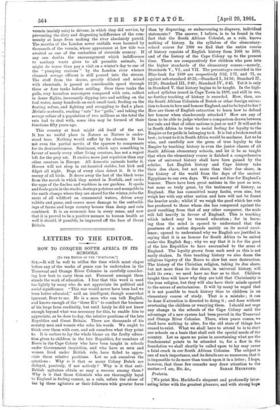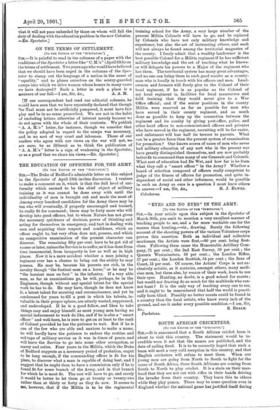LETTERS TO THE EDITOR.
HOW TO CONQUER SOUTH AFRICA IN ITS SCHOOLS.
[TO THE EDITOR OF THE "SPECTATOR.1
SIR,-It will be well to utilise the time which must elapse before any of the works of peace can be undertaken in the Transvaal and Orange River Colonies in carefully consider- ing how best to carry them out. Foremost amongst them stands the work of education. I fear that this word is used too lightly by many who do not appreciate its political and social significance. " This war would never have been had we been better educated," said an intelligent, though somewhat ignorant, Boer to me. He is a man who can talk English, and knows enough of the "three R's" to conduct the business of his large farm creditably, but until lately he did not know enough beyond what was necessary for this, to enable him to appreciate, as he does to-day, the relative positions of the late Republics and Great Britain. There are thousands of his country men and women who echo his words. We ought to think over them with care, and ask ourselves what they point to. • It is useless to lay the whole blame on the faulty educa- tion given to children in the late Republics, for numbers of Boers in the Cape Colony who have been taught in schools under Government inspection, and who have as men and women lived under British rule, have failed to appre- ciate these relative positions. Let us ask ourselves the qiiestions : Why is it that so many Colony Dutch are disloyal, passively, if not actively ? Why is it that anti- British agitators obtain so easy a success among them ? Why is it that those Colonials who are thoroughly loyal to England in feeling cannot, as a rule, refute the abuse of her by these agitators or their followers with' greater force than by disproving, or endeavouring to disprove, individual statements ? The answer, I believe, is to be found in the fact that the South African Colonist, as a rule, known
nothing of history. In the syllabus of the elementary- school course for 1900 we find that the entire course of history consists of English history from 1066 to 1688, and of the history of the Cape Colony up to the present time. There are comparatively few children who pass into
the higher standards of the elementary course,—namely, Standards V., VI., and VII. The percentages recorded in the Blue-book for 1899 are respectively 3.52, 1.71, and -71, as against sub-standard 48.33,—Standard I., 14.56; Standard II., 13.28 ; Standard III., 949 ; Standard IV., 6-45. Yet it is only in Standard V. that history begins to be taught. In the high- school syllabus issued in Cape Town in 1899, and still in use, no further teaching of history is recorded. How, then, are the South African Colonists of Dutch or other foreign extrac- tion to learn to love and honour England, and to be loyal to her ?
How are those of English extraction to learn how to defend her honour when slanderously attacked ? How are any of them to be able to judge whether a comparison drawn between her rule and that of other nations is just or not? It will not do in South Africa to trust to racial feeling for loyalty to the
Empire or for pride in belonging to it. It is but a brokenreed at best; to trust to it in South Africa would be madness. Let us be wise, and carefully sow the germ of true loyalty to the Empire by teaching history in even the junior classes of all South African elementary schools, and let it be so taught that when the elementary course is finished a comprehensive view of universal history shall have been gained by the scholar. Let : English history and Cape history take their due share, but not more than their due share, in the history of the world from the days of the ancient Egyptians to our own days. We need not fear for England's honour. There have been great nations in the past as now, but none so truly great, by the testimony of history, as England. She has committed many faults, even sins, but weigh her with any other nation and hers will not be found the heavier scale; whilst if we weigh the good which her rule has produced to those whom she has conquered against the good resulting from that of any other conqueror, the scale will fall heavily in favour of England. This is teaching which indeed may be termed education ; for in learn. ing thus the mind is opened to understand that the greatness of a nation depends mainly on its moral excel- lence; opened to understand why we English are justified in saying that it is an honour for South Africa to be united under the English flag ; why we say that it is for the good of the late Republics to have succumbed to the arms of England. The loyalty grown from such seed as this is not easily shaken. In thus teaching history we also doom the religious bigotry of the Boers to slow but sure destruction. The history of the Christian religion, taking its due share; but not more than its due share, in universal history, will hold its own ; we need have no fear as to that. Children taught thus will know why they are told that Christianity is- the true religion, but they will also have their minds opened to the errors of sectarianism. It will by many be urged that it is not possible to teach history thus to children in an elementary course of study. That is a mistake ; it can be done if attention is directed to doing it ; and done without overtaxing the children or wearying them. I should not urge any change in the schools of the Cape Colony until the advantage of a new system had been proved in the Transvaal and Orange River Colonies. There, when peace comes, we shall have nothing to alter, for the old state of things has ceased to exist. What we shall have to attend to is to start our schools on a basis that shall suit the special needs of the country. Let us spare no pains in ascertaining what are the: fundamental points to be attended to, for a flaw in the foundation we shall shortly be called upon to lay may cause a fatal crack in our South African Colonies. The subject is 'one of such importance, and its details are so numerous, that it is impossible to do more than touch upon it in a letter; I hope, however, that these few remarks may draw attention to the [We print Mrs. Heckford's eloquent and profoundly inter- esting letter with the greatest pleasure, and with strong hope
that it will not pass unheeded by those on whom will fall the duty of dealing with the education problem in the new Colonies. —En. Spectator.]







































 Previous page
Previous page